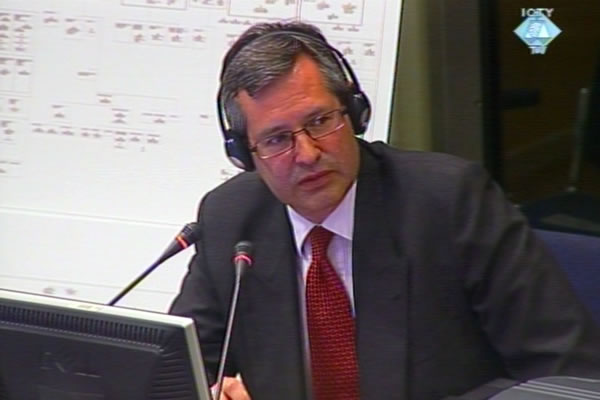Home
KARADZIC’S CLEARING UP ‘MISCONCEPTIONS’
In the final part of his cross-examination of military expert Richard Philips, former Bosnian Serb leader Radovan Karadzic tried to clear up the ‘misconception’ that the SRK was a ‘huge force fighting against an unarmed city’. According to him, it was ‘a people’s army’ and difficult to control
 Richard Philips, witness at the Radovan Karadzic trial
Richard Philips, witness at the Radovan Karadzic trial In the final part of his cross-examination of Richard Philips, the accused Radovan Karadzic tried to clear up ‘the misconception’ which, in his view, the prosecution military expert presented to the judges in his analysis of the organizational structure of the Sarajevo-Romanija Corps, the efficiency of its command and control system and the reporting system within the corps.
Not satisfied with the witness’s claim that the SRK emerged from the ‘remains’ of the JNA 4th Corps and that it was well armed, Karadzic tried to prove that the SRK was not ‘a huge force fighting an unarmed city’, but ‘a people’s army, an army of people who lived in their homes and went to the front line in shifts’. Karadzic calculated that about 10 percent of a total of 200,000 Serbs living in the Sarajevo valley before the war were drafted. When asked what could force the people to send ‘every male there was’ to join the army, the witness said he couldn’t ‘get into the mindset’ of other people.
Karadzic also tried to show that the reporting system in the SRK was not ‘as good and as state-of-the-art’ as the witness described it. According to Karadzic it was ‘arduous and uncertain’. As Karadzic noted, the front line in Sarajevo stretched for 240 km and that made communications and control much more difficult. Karadzic said that in some cases couriers were used by the corps and brigade commands to communicate.
The witness didn’t want to comment on how long the Sarajevo front line was because he didn’t take it into account when he studied the SRK structure. Also, Philips said that it was normal for the communication systems to be disrupted from time to time; it happened in all armies and in situations like that couriers were used to maintain communications.
‘The people’s army’, Karadzic went on, had never been ‘entirely harmonized’ and was therefore impossible to control. Karadzic quoted cases of disciplinary infractions in some SRK units. Most concerned excessive alcohol consumption and lack of officers. The witness explained those were ‘normal’ and ‘constant’ problems that trouble every army in a war.
The indictment charges Karadzic with participation in a joint criminal enterprise together with Ratko Mladic, Stanislav Galic, Dragomir Milosevic and others from April 1992 to November 1995. The goal of the joint criminal enterprise was to start and implement a sniping and shelling campaign against the civilians in Sarajevo in order to spread terror among the civilians.
The trial of Radovan Karadzic continues on Monday, 21 June 2010.
